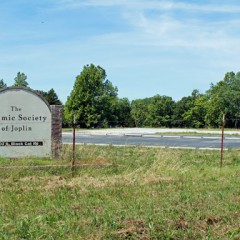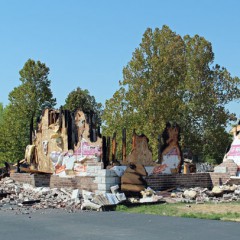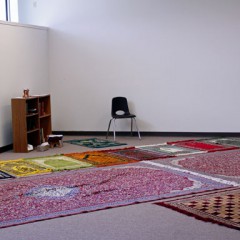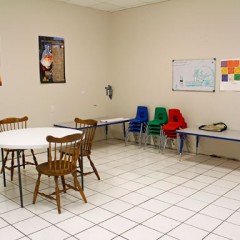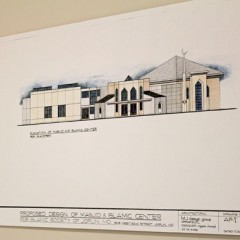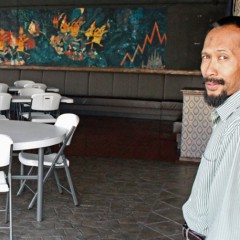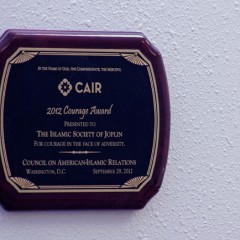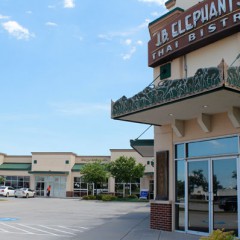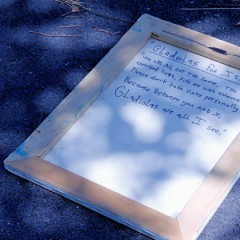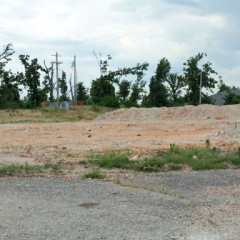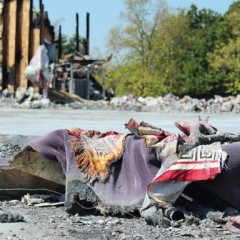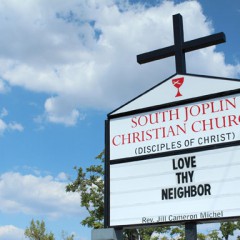This week, Faith & Values news is exploring what happens when violence crosses thresholds in churches, synagogues and mosques. In yesterday’s report, we learned how a hateful mosque burning rippled through the Toledo area, making congregations across the town stand up in vigilance.
Today’s story looks at the site of another burned mosque, this time in the city of Joplin, Mo. What happens when your worship space burns to the ground, and no one even knows who or what is at fault? How do you go on?
Imam Lahmuddin Lahmuddin of the Islamic Society of Joplin (Mo.) was sitting down to a pre-dawn breakfast on Aug. 6, 2012, during the holy month of Ramadan, when his phone rang.
The mosque was on fire.
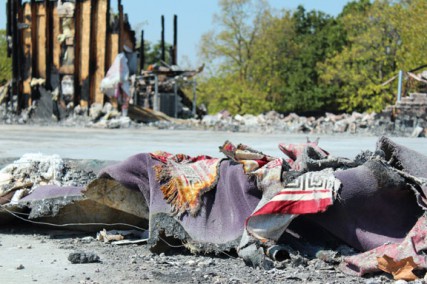
It was destroyed – and with it the Scriptures, the prayer rugs, the educational posters, the collection money, the food stored for Iftar (the breaking of the Ramadan fast) and everything else inside.
This was the mosque’s second fire that summer – on July 4, 2012, someone set the roof on fire, but it was extinguished before too much damage was done. Though the security camera captured an image of the suspect, he has yet to be identified.
The two fires have not been officially connected, and the cause of the devastating blaze in August remains a mystery – any camera evidence burned in the flames. In both cases, FBI investigations are ongoing.
LISTEN: MOVING ON — JOPIN MUSLIM COMMUNITY MOVES FORWARD AFTER MOSQUE BURNS TO GROUND (MP3)
Osama Chowdhury, a 21-year-old member of the Islamic community, remembers feeling shock and anger: “Kind of like, why did this happen to us?” he said.
The organization The American Muslim lists 13 incidents in which Missouri mosques have been threatened or vandalized in the last decade. In 2011, someone burned three copies of the Quran, the Muslim holy book, outside a mosque in Springfield, Mo. In 2009, a man in Cape Girardeau, Mo., was convicted of hate crime charges for breaking the windows of the mosque there.
And in 2008, the sign in front of the Joplin mosque was set on fire.
Yet Lahmuddin said last year’s incidents in Joplin came as a surprise – he had never really felt threatened, and the interfaith movement in the community was healthy. The night before the mosque was destroyed, Christians and Jews had joined the Muslims for an evening meal.
Mark Statler, a pastor at St. Paul's United Methodist Church in Joplin, said the fire came as a blow to the city. Back in 2010, the community had rallied together after a tornado tore through the town, and the fire shattered the “we are Joplin” mentality.
“It kind of shattered this illusion that we were this strong, unified, all-on-the-same-page kind of community,” he said.
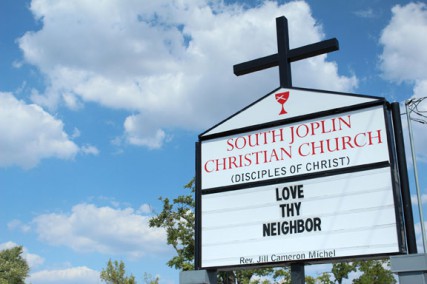
His congregation sent cards to the Muslim community. Another church offered its building for an event. Some churches put messages of love on their signs.
This summer, the interfaith community launched a series of panels about the Abrahamic faiths.
“We appreciate that they accept us as Joplin residents – that’s who we are here,” Lahmuddin said.
Still, there are precautions in place. After the fire —with the Toledo fire and the Sikh temple shooting in Wisconsin fresh in their minds — the Islamic Society requested that law enforcement be present during their busiest times. Someone from the sheriff’s department is parked outside the temporary mosque during Friday prayers, on Sundays (when the most children come) and during major activities.
They also built a privacy wall in their temporary location to obstruct the view through the front glass walls of the strip mall suites they rent.
Location was one of the biggest questions the community faced in moving forward: Should they stay at the old lot, outside of city limits on Black Cat Road, or move into town?
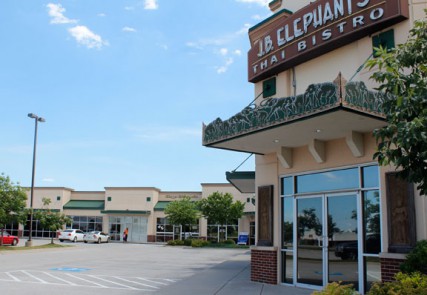
Many members and friends thought building within city limits would be best, so that’s what they decided to do. In part, the decision was for safety; in part, it was convenience. They bought a plot of land near some of Joplin’s medical facilities, and since many members of the Islamic Society work in medicine, the new place will be close to work.
Construction hasn’t started yet, but is expected to begin as soon as fundraising for the estimated $1 million building is complete.
In the immediate aftermath of the fire, financial support poured in from around the country. An online fundraising campaign, started by someone from out-of-state, brought in more than $400,000.
Lahmuddin said he has also encouraged local Muslims to make donations – and there’s a spiritual reason for that.
“It is hard, but we survive,” he said. “We base everything on faith. We should understand that everything that happens, that is because of the decree of God. He owns everything; whatever we think we own is, in fact, a loan from God. So whenever he wants to take it back, he takes it back.”
This fire, he said, is a chance to do a good deed through the rebuilding process.
“In Islam, the prophet mentions that whoever builds a mosque, a house of worship, God will build for him a mansion, a palace, in paradise,” he said.
“And in that place, we don’t have to worry about paying utilities,” he said with a laugh.
He laughs often, even when talking about the difficulties of the fire.
“Deal with it patiently and with faith,” he said, with another laugh, “because this is not a common thing.”
That attitude extends to some of the other members. For 17-year-old member Alvian Salim, the best way to deal with a situation like this is “just to keep your head up and know that things will get better from there.”
The Islamic Society members have been rewarded for their response. Last fall, they received the Courage Award from the Council on American-Islamic Relations for their “courage in the face of adversity.”
Kellie Kotraba is the editor of Columbia Faith & Values (ColumbiaFAVS.com).
Come back the rest of the week for parts four and five of the “Religion & Violence” series, here on favs.news. Use the links below to read Part 1 and 2.




